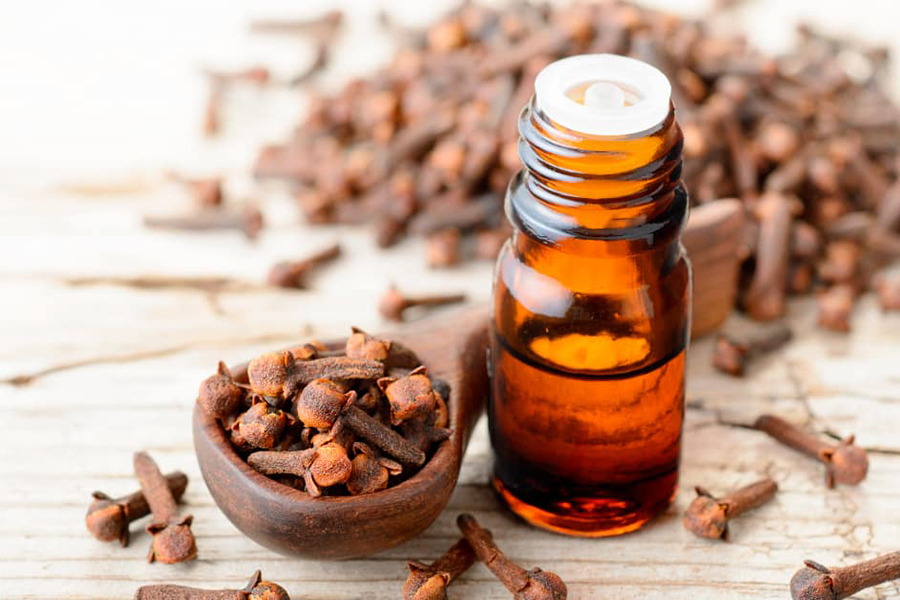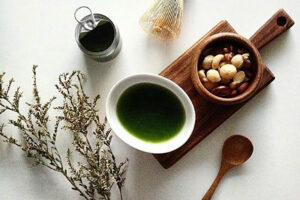The clove is an aromatic dried flower bud from a tropical evergreen of the same name. Originating from Indonesia’s Spice Islands (aka, Maluku Islands), cloves have a long history as a highly-valued commodity, being worth their weight in gold in 17th – 18th century Europe.
Cloves first reached Europe during the 4th century BC, where they quickly became a top remedy for digestive problems, nausea, and vomiting. But it wasn’t until the Medieval Ages that the clove took on legendary medicinal powers. As the story goes, during the 15th-century bubonic plague, a group of spice merchants-turned-thieves preyed on victims but miraculously never got sick. When they were eventually caught, the judge offered clemency in return for information on how they resisted the illness. Their secret was a mix of protective herbs, with clove as the main ingredient. Today, “thieves oil”, a blend of antibacterial/antiviral essential oils, is an important natural immune-boosting remedy.
Way before this dark Western backstory unfolded, in 200 AD China, the emperor reportedly used clove as a “mouth perfume” to keep the breath of his courtiers smelling sweet. Conventional western medicine has since confirmed its effectiveness against halitosis (bad breath). In fact, clove is still used in traditional Chinese and Ayurvedic medicine for a range of healing powers that are being proven by modern science:
- Fights skin infections including acne due to its anti-microbial & anti-fungal properties
- Reduces free radicals linked to cancer due its extremely high ORAC value (Oxygen Radical Absorption Capacity) – the highest out of 72 essential oils
- Reverses inflammation and cellular oxidation, which contributes to aging
- Relieves respiratory disorders by decongesting and clearing bronchial passages while fighting pathogens
Across cultures and history, clove has been especially prized for its multiple uses in oral healthcare.
According to The History of Dentistry by Walter Hoffmann-Axthelm, the first reference to cloves in dentistry was made by 10th-century Arabian dentist Al-Gazzar, where he mentions them for controlling mouth odors and pain. Nowadays we know that eugenol — the main compound in clove — is to thank for its powerful analgesic (pain relieving) and antiseptic properties. The Journal of Dentistrypublished a study in 2006 proving clove essential oil had the same numbing effect as the topical agent benzocaine, making it an alternative before needle insertion. Clove oil can also relieve pain caused by dry socket, a possible complication of tooth extraction. When diluted with coconut oil it even makes a treatment for teething infants.
Clove oil reduces the bacteria that cause gum disease and helps create a balanced oral biome. Our mouths contain over 700 types of bacteria—some beneficial, others harmful. Rather than killing all the bacteria, which is what antibiotics and harsh mouthwashes do, bacteria should be “managed” to encourage the growth of beneficial microorganisms. Good bacteria produce hydrogen peroxide that keeps harmful bacteria under control. Many strains of bad bacteria develop resistance to antibiotics. But according to a report published in the journal Compendium, bad bacteria usually don’t develop resistance to clove oil.
Clove oil is effective against the bad bacteria that can move from your mouth into your arteries, causing a stroke or heart attack.There have been many studies linking gum disease and heart disease. A 2016 study in Oral Health and Coronary Heart Disease found that a common bacteria associated with periodontal disease, Porphyromonas gingivalis (P. gingivalis), invaded endothelial cells as well as atheromatous tissues, creating a pathogenetic link between periodontal disease and coronary heart disease. Further studies have proven clove oil’s effectiveness against P. gingivalis.
Bottom line, if your oral care doesn’t include clove oil, you’re missing out on incredibly effective, natural protection against the bad bacteria that causes gum disease.
Clove truly delivers a mouthful of dental benefits– here are a few more impressive attributes:
- Reduces gum swelling and irritation thanks to its anti-inflammatory properties
- Stimulates circulation, due to its “hot” nature, enhancing gum tissue health
- Helps remineralize teeth due to the protective properties of eugenol against acids (that can erode dentin), according to a 2012 research study conducted by the Indian government
Thanks to its essential role in oral health, you’ll find clove in several natural oral care products.
Ready to try Clove Essential Oil in your Oral Care Routine? Here’s how:
Make an essential oil “tooth and gum” serum: Grab a shot glass – mix 1 teaspoon of organic vegetable oil from your pantry (like olive oil, coconut oil, sesame oil) with 1 drop of Clove bud essential oil (therapeutic grade). Make a larger quantity (using this proportion) for use in your oral care routine and put this in a glass dropper bottle (you can buy this on Amazon or a natural grocery store). Try adding other bad bacteria fighters like Cinnamon essential oil. Caution: Clove essential oil is very strong and should always be diluted (do not use straight).
> Use it with your dental floss: apply this to your dental floss (you can use your fingertips or put the floss directly into a shot glass). Floss, as usual, paying close attention to the gumline (be gentle). Not into DIY? Buy Akamai Infused Black Floss which features Clove essential oil, Cinnamon essential oil and Tea tree essential oil to fight bad bacteria in the gum line while adding plant-based trace minerals (fulvic acid) to improve the health of the gum tissue.
> Add it to your toothpaste: Apply your toothpaste or powder to your toothbrush, add a few drops of your serum. Not into DIY? Buy Akamai Mineral Toothpaste Powder which contains essential oils of Clove, Cinnamon, Tea Tree, Peppermint and Anise along with clays to naturally fight bad bacteria.
> Have a toothache? Apply the mixture directly to the tooth and surrounding gum with your finger or a cotton swab.
Experience all of the superpowers of clove for healthy teeth and gums with these Akamai natural oral care products.
Read more about our natural Oral Care Routines and How to Optimize your Oral Health.
This story first appeared at Akamai Basics
Sources:
In Vitro and In Vivo Effects of Clove on Pro-inflammatory Cytokines Production by Macrophages
History of Dentistry (Quintessence Books)
The Journal of Dentistry
Compendium, Antibacterial Action of Eugenol…In Vitro Inhibitory Effect of Clove Essential Oil and Its Two Active Principles on Tooth Decalcification by Apple Juice
Oral Health and Coronary Heart Disease
Antibacterial Activity of Cinnamon and Clove on Oral Biofilm.
DISCLAIMER: *These statements have not been verified by the FDA. This product is not intended to treat, cure or prevent any disease.
This site offers health, wellness, and nutritional information and is intended for educational purposes only. Readers should not rely on this information as a substitute for, nor does it replace professional medical advice, diagnosis, and treatment. Any concerns or questions about your health should always be directed to a physician or other health-care professional. Do not disregard, avoid or delay obtaining medical or health related advice from your healthcare professional because of something you may have read on this site. The use of this information on this site is solely at your own risk. Nothing stated or posted on this site or available through any services are intended to be, and must not be taken to be, the practice of medical or counseling care. For purposes of this agreement, the practice of medicine and counseling includes, without limitation, psychiatry, psychology, psychotherapy, or providing health care treatment, instructions, diagnosis, prognosis or advice.







